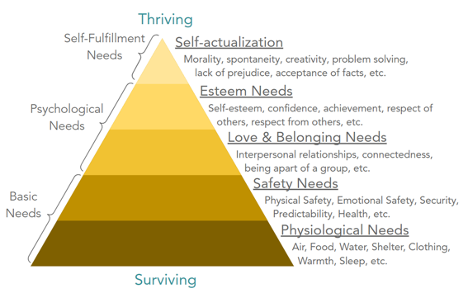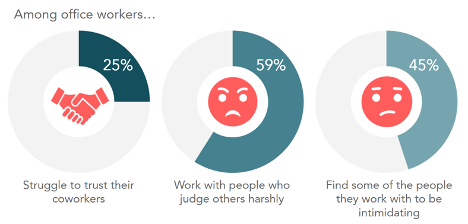The evolution of work
Learn about the past, present, and future of the U.S. workplace through the Connecting Generations article series!

Connecting Generations is on a mission to spark connection, understanding, and empathy across generations in the workplace. This 3-part series will cover the evolution of work, disconnection in the workplace, and how we can create positive workplace experiences.
Change is the only constant in life and business.
This is especially true for the state of the U.S. workplace. While the pandemic has accelerated the rate of workplace change, there has been significant evolution over the past 50 years.
The working world of the 1970s was a different place from a functional perspective. Computers were the size of rooms! Office work was almost exclusively done at the office. Now, 45% of us work from home either all or part of the time. Technological advancement has not only given us the ability to tap into the virtual office at any time, but it also enabled us to socially distance during the early days of the pandemic. We have never been so interconnected!
The American workplace has also shifted culturally. Many of our past leaders favoured certain demographics and ways of living. This created a situation where workers had to conform to a specific standard to find stability and success. Many more people accept and are inclusive of differences, though many still face exclusion. Additionally, the workplace has become much less hierarchical and top-down. Employees have more freedom to challenge their managers and the status quo.
The age of the company lifer is over.
More jobs have become commoditised. Undifferentiated and interchangeable roles make it easier for workers to switch positions and employers. Ironically, companies with commoditised roles are now seen as commodities among workers. Plus, switching roles and companies regularly has become normalised and destigmatised. More people than ever feel empowered to leave companies that aren't meeting their needs. Power has shifted. Employers are now having to adapt to meet the employee's needs after decades of employees having to adapt to meet the employer's needs. Perhaps the two are striking a balance.
We came away from the pandemic with stronger values and different priorities. While remote workers were reminded of the simplicities of home and the importance of life outside of work, many of those who couldn't work remotely were called essential when they really felt expendable. Many felt forced to compromise their safety to survive financially. Now, as we get back to a version of normalcy, many workers are no longer willing to compromise their needs and values and are leaving their jobs to find employers who are a better fit. This is particularly true among the younger generations.
Maslow's Theory of Human Motivation and Hierarchy of Needs
According to Maslow's Theory of Human Motivation, we are naturally motivated towards satisfying our unmet needs. While every culture prioritises needs differently, American culture tends to prioritise basic needs, psychological needs, and self-fulfilment needs (Figure 1). Maslow's theory also says that once we feel secure about a need being met, we naturally and often unconsciously move on to figuring out how to meet the next need.
 Maslow’s Hierarchy of Needs
Maslow’s Hierarchy of Needs
So… what do workers need, and why do they need it? According to The Conference Board, the top 5 things workers who want to leave their companies are looking for are flexible work location (31%), advancement in their careers (30%), better pay (30%), connection to a mission/purpose (25%), and a new supervisor/manager (22%). Let's look at these needs through the lens of Maslow's Theory:
Location flexibility empowers workers to choose a setting that best meets their unique physiological, safety and belonging needs. Plus, we work best where we are comfortable! Unfortunately, the office can be an uncomfortable place. Some are concerned about COVID, while others feel socially uncomfortable. Our research found that 19% of workers do not feel comfortable being themselves at work. This is especially true for those who have historically been excluded from the workplace. Ultimately, location flexibility allows the employee to interact with their employer in the way that's most sustainable for them.
Advancing in one's career meets our esteem needs. It is a sign of social acceptance and respect from others. Given that 38% of workers felt like their careers stalled during the pandemic, many who are not being promoted internally are considering other options.
Better pay increases one's financial security, increasing one's ability to meet their physiological needs. Feeling secure in one's ability to meet their most basic needs reduces stress and allows them to focus on their higher-level needs and life satisfaction.
Connection to a mission/purpose directly addresses love & belonging needs. It helps workers feel like they're a part of a group and making a positive difference. Our research found that 61% agree or strongly agree that they're doing meaningful work. Additionally, more workers are aware of their impact and are worried about participating in work that has the potential of harming others economically, socially, psychologically, etc.
A new supervisor/manager: 1 in 4 workers have a less than ideal relationship with their manager. Negative relationships negatively impact our health and wellbeing. This is especially true for relationships where one party has power over the other, like in manager-employee relationships. Negative relationships are stressful and often degrade self-confidence. They spill over and negatively impact our personal lives. What happens at work does not stay at work.
It's mutually beneficial!
Meeting employee needs and fostering positive experiences is not only good for the employee, but it is also good for the employer! In 2014, researchers at the Harvard Business Review uncovered that workers feel better, perform better, and work more sustainably when their renewal, value, focus, and purpose needs are met. Additionally, Gallup found that a positive workplace experience positively impacts employee engagement, retention, and performance and supports better decision making.

Findings from Connecting Generations research
Unfortunately, few feel like they can be honest about what they need with their employer. Our workplaces lack empathy and understanding… 25% of office workers struggle to trust the people they work with, while 59% work with people who judge others harshly, and 45% find some of the people they work with intimidating (Figure 2). Many feel it isn't okay to communicate their needs and challenges with the people they work with. This has created a situation where workers would rather switch companies than communicate with their current managers. The risk of being misunderstood and devalued is too great.
Follow the Connecting Generations article series to learn about workplace disconnection.
The second article in our series will explore disconnection in the workplace. Specifically, the article will discuss the experiences different generations have at work and how our perceptions of others affect those experiences.
This series is brought to you by Connecting Generations, a research-driven initiative from Thoughtful Research and HauckEye with the mission of sparking connection, understanding, and empathy across generations in the workplace. Connecting Generations offers workshops to teams who want to foster positive work experiences and strengthen their connection. Please visit our website to learn more.
This work features Connecting Generations' research. In 2021, the team interviewed 29 marketing researchers and surveyed 1000 office workers to learn more about intergenerational disconnection and the workplace experience. We were proud to partner with Veridata Insights to field the survey portion of our study.
Erin Sowell MMR
Researcher, Consultant, & Founder at Thoughtful ResearchErin Sowell is a researcher and consultant who applies ecosystem science to business and marketing. She is the founder of Thoughtful Research, an insights consultancy that helps leaders, brands, and organizations navigate rapidly changing markets and business environments. Prior to Thoughtful Research, Erin was an Associate Manager of Innovation Insights at Georgia Pacific and Research Manager at Kroger's Retail Data Science, Insights, & Media Company, 84.51°. Before entering the Insights Industry, Erin represented the World Corrosion Organization at the United Nations. Erin received her Master of Marketing Research from the Terry College of Business at the University of Georgia and her B.S. in Earth and Environmental Science from Lehigh University.


